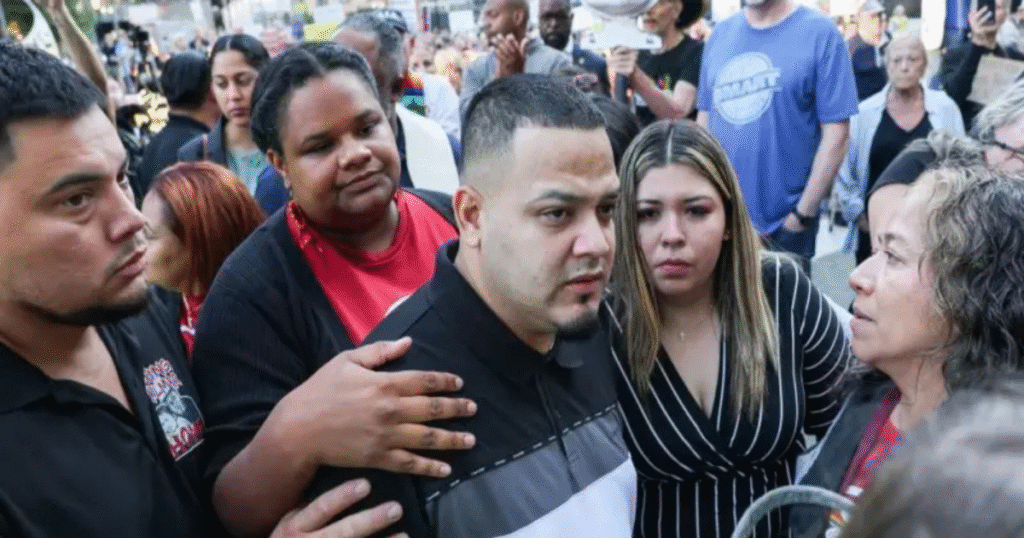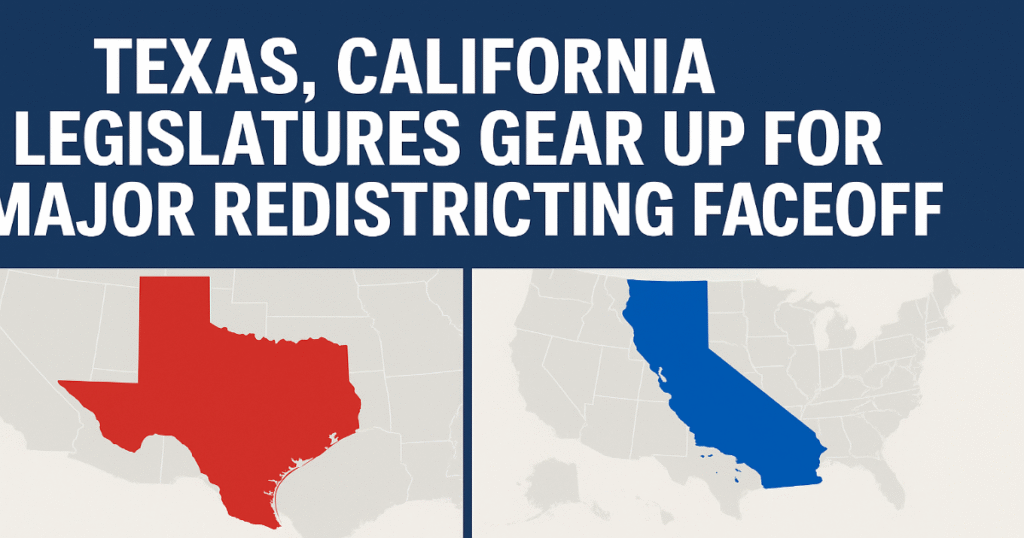
Kilmar Abrego García Detained Again: ICE Pushes for Possible Second Deportation Amid Legal Battles
When Kilmar Abrego García walked into the Immigration and Customs Enforcement (ICE) field office in Baltimore on Monday morning, he expected nothing more than a routine check-in. Instead, the 38-year-old father of two was taken into custody for the second time this year—setting off a storm of legal challenges, protests, and political debate over immigration enforcement in the United States.
ICE officials confirmed later in the day that Abrego García could be deported within days. But this time, the Salvadoran national may not be sent back to El Salvador, his home country, but rather to Uganda—a place with which he has no ties. His lawyers say the plan is unconstitutional and retaliatory, a punishment for refusing to plead guilty in an unrelated criminal case.
“This is not just about one man,” said attorney Simon Sandoval-Moshenberg, who has represented Abrego García for years. “This is about whether our government can weaponize deportation, use it as leverage in criminal cases, and strip people of due process protections. The law does not allow that.”
A Case That Refuses to End
Abrego García’s story is extraordinary, even by the often chaotic standards of America’s immigration system.
He first arrived in the United States in 2011, fleeing gang violence in El Salvador. After years of hearings, he was granted withholding of removal in 2019 by an immigration judge—a form of protection for people who would face persecution if returned to their home country. That ruling should have barred deportation to El Salvador.
But in March 2025, ICE put him on a plane anyway. Within days, he was behind bars in El Salvador’s notorious CECOT mega-prison, a facility known for its harsh treatment of alleged gang members. His wife, Jennifer Vasquez Sura, a U.S. citizen, said she had just ten minutes to collect their child before ICE officers forced her husband onto the deportation flight.
“It was like a nightmare,” Vasquez recalled. “One moment we were together as a family, and the next moment they had taken him away. My son cried every night asking where his father was.”
Court Orders His Return
The wrongful deportation sparked a lawsuit in federal court. On April 4, Judge Paula Xinis ruled that ICE had acted illegally, calling the deportation a violation that “shocked the conscience.” She ordered the government to return Abrego García immediately.
By June, he was back in the U.S., but his troubles weren’t over. Tennessee prosecutors charged him with human smuggling, tied to a 2022 traffic stop in which police discovered several undocumented immigrants in his car. Abrego García pleaded not guilty, insisting he was simply giving acquaintances a ride. The case is still pending.
His lawyers argue that the criminal charges are thin and that the federal government is using them as an excuse to target him again for deportation.
The Uganda Option
Over the weekend, Abrego García’s legal team received startling news: ICE intended to deport him not to El Salvador, where courts have already said he faces danger, but to Uganda.
The government had previously offered him what his attorneys describe as a “deal”: plead guilty to the Tennessee charges, and he could instead be sent to Costa Rica, where officials were willing to accept him with refugee or residency status. Abrego García refused the plea, maintaining his innocence.
“Uganda is the stick, Costa Rica was the carrot,” said Sandoval-Moshenberg. “The government is punishing him for refusing to admit to a crime he didn’t commit.”
Deporting someone to a third country is rare, though not unprecedented. Critics argue it violates international law, particularly the principle of non-refoulement, which prohibits sending someone to a place where their safety isn’t guaranteed. Abrego García has no family, community, or support network in Uganda.
Government Response: ‘A Dangerous Individual’
The Department of Homeland Security (DHS) has painted a very different picture of Abrego García. In a press release, DHS Secretary Kristi Noem labeled him an “MS-13 gang member, human trafficker, and predator.”
“These individuals pose a threat to our communities,” Noem said. “The Biden administration turned a blind eye to gang members like Abrego García. Under President Trump, we will not hesitate to remove them.”
But despite those serious accusations, Abrego García has not been convicted of gang activity, human trafficking, or sexual crimes. Judges reviewing his immigration cases have expressed skepticism about the government’s claims. His defense attorneys say the allegations are designed to sway public opinion and justify harsh treatment.
“This is character assassination,” said attorney Rachel Jordan, part of his legal team. “If the government had real evidence, they would bring charges in court. Instead, they’re smearing him in the press while trying to disappear him overseas.”
Rallying Outside ICE Offices
As word spread of his detention on Monday, supporters gathered outside the Baltimore ICE field office. Faith leaders led prayers, children held signs saying “Free Abrego,” and union members stood alongside immigrant-rights activists.
“Kilmar is not a criminal. He is a father, a husband, a worker,” said Rev. Mark Stephenson, who joined the vigil. “We cannot allow our government to tear apart families for political gain.”
Maryland Senator Chris Van Hollen also issued a statement, blasting the Trump administration’s handling of the case. “The lies being spread about Mr. Abrego are dangerous and false,” Van Hollen said. “We will fight to ensure his rights are protected.”
Family in Limbo
For Vasquez and her children, the uncertainty is unbearable.
“Every time the phone rings, I’m afraid it’s someone telling me they put him on a plane again,” she said. “How do I explain to my son that his father might be sent to Uganda, a place he’s never even heard of?”
Abrego García himself has said little publicly since his detention. In a brief phone call to his wife, he said only: “Tell everyone I am strong. Tell them I will fight.”
Legal Battles Ahead
Within hours of Monday’s arrest, Abrego García’s lawyers filed an emergency motion in federal court, seeking to block deportation until a judge can review the plan. They argue that ICE violated Judge Xinis’s earlier order requiring at least 72 hours’ notice before deporting him to any third country.
A temporary injunction has been granted, giving the legal team two days to prepare arguments. If successful, the ruling could set an important precedent for how far the government can go in deporting individuals to countries with which they have no ties.
“This is about due process,” said Sandoval-Moshenberg. “If they can do this to Kilmar, they can do it to anyone.”
The Bigger Picture
Abrego García’s case has become a flashpoint in the broader immigration debate. Critics of the administration say it highlights how deportation can be used as a political tool, while supporters argue it shows toughness on crime and border enforcement.
Human-rights groups warn that third-country deportations undermine international refugee protections. “This is an alarming development,” said Ana Ortega, director of Refugees First. “Sending people to countries where they have no support or legal protections is cruel and dangerous.”
At the same time, advocates say the case underscores the personal toll of deportation on families and communities. Abrego García had been working in construction, supporting his family, and participating in his local church. His sudden detention has left friends and neighbors shaken.
What Comes Next
The next court hearing will determine whether Abrego García can remain in the U.S. while his criminal case is resolved—or whether ICE can move forward with deportation to Uganda.
Legal experts say the decision could have far-reaching consequences, potentially shaping how the government handles deportation cases for years to come.
For now, Abrego García remains in custody, his fate hanging in the balance.
“This is bigger than me,” he told his lawyer. “It’s about the system, and whether people like me ever get justice.”
Conclusion
The story of Kilmar Abrego García is one of mistakes, resilience, and a fight for due process in a deeply divided America. Wrongfully deported once, returned under court order, and now facing the threat of removal to a country he has never known, his case raises fundamental questions about fairness, the rule of law, and the limits of government power.
As his lawyers battle in court, his family waits anxiously at home. For them, and for the community that has rallied to his side, the hope is simple: that the United States lives up to its own promise of justice.
Also Read: Jeffries Blasts Trump Over Redistricting ‘Power Grab,’ But Ducks Questions on New York Strategy
Visit: Cheapest Sale

Hey I am Srimanta Pradhan brings 10 years of experience to News Broadcast and Marketing, specializing in effective communication.A specialized content writer with a decade of expertise crafting compelling narratives for News Broadcast and Marketing. Transforms complex information into engaging, impactful content.




















